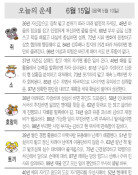[Opinion] Chinese Satellite State?
If Chinas economy continues to grow as rapidly as it did in the past decade, if China increases its military budget by two digits as it has in recent years, and if Chinas soft power keeps on growing, China will occupy a stronger position than it does now. Therefore it is important for Korea to stay on good terms with China, but Korea can end up as a satellite state of China if it becomes too dependent. This is the prospect presented by Joseph Nye, a professor at Harvard University and former Assistant Secretary of Defense for International Security Affairs in an interview with a Korean newspaper on November 7.
The Chief Economist of Morgan Stanley, Andy Xie, warned last month, Korea can take the role of a mere border city of China or degrade to the status of a poor nation like the Philippines if Korea fails to equip itself with a growth engine within four or five years. Satellite state is a term of international politics which refers to the weak nations that survive under the political, economic and military dominance or influence of a nearby superpower. The Eastern European nations which were dominated politically, economically and militarily by the Soviet Union after the Second Ward War were satellite nations. They were freed from the status of satellite nations with the collapse of the Soviet Union.
China has a history of receiving tributes from East Asian nations including Korea which was based on Sino-centrism and China-installed crown princes by the end of the 19th Century. China, aiming to assume the hegemony of Northeast Asia based upon Sino-centric nationalism, is busying itself with the history-distorting Northeast Asia Project as if to incorporate the history of Balhae into the Chinese history, following the history of Goryeo, and to occupy Mt. Baekdu.
Relying on China for 80% of its energy, one third of food and 48% of foreign trade, North Korea has a high possibility of degenerating into a satellite state of China, and is even giving birth to forecasts whether it is not being incorporated as Chinas fourth northeast province.
In June 2003 President Roh Moo-hyun pointed to China prior to the U.S. as the nation with which to keep friendly terms. The two regimes of South and North Koreas sing together independent autonomy against the U.S., crying out the slogan of between members of a nation and between us, but one of them is incapable of creating the engine for new development and the other is incapable of economic independence. Is the whole Korean peninsula not falling into the pitfall of anti-independence from China?
Gwon Soon-taek, Editorial Writer, maypole@donga.com







